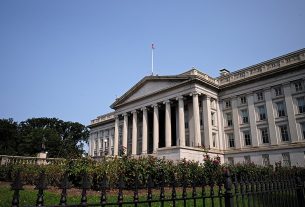
Group photo in the presence of Ding Xuexiang, Maroš Šefcovic, Wopke Hoekstra, Virginijus Sinkevičius.
On 18 June, Executive Vice-President of the European Commission Maroš Šefčovič and Vice-Premier of the People’s Republic of China Ding Xuexiang chaired the Fifth EU-China High Level Environment and Climate Dialogue (HECD) in Brussels, Belgium. Commissioner for Environment and Oceans and Fisheries Virginijus Sinkevičius and Commissioner for Climate Action Wopke Hoekstra also participated for the EU side.
Both parties discussed their respective domestic climate and environmental policies, as well as bilateral cooperation and multilateral negotiations. They reconfirmed that the HECD is an important platform for exchange of views and cooperation and for advancing implementation and ambition.
“EU-China dialogues on climate and environment have provided us with the space to deepen our understanding of each other’s policies and to discuss areas of mutual interest,” EVP Šefčovič stated. “The interconnected challenges of climate change, pollution, biodiversity loss and desertification pose a sever threat to our economic and social stability, and to our food security. It is important to keep working together to address these issues that have increasingly severe cross-national and global impacts.”
Both sides recognised the urgency of global climate action to respect the goals of the Paris Agreement and the targets of the Kunming-Montreal Global Biodiversity Framework. EVP Šefčovič highlighted that while there are areas where EU and China do not see eye to eye, green should stay the colour of their cooperation.
Climate
Both sides agreed to work together to follow up on the Global Stocktake and the UAE Consensus concluded at COP28. The EU side stated its determination to continue to implement its climate and energy policies to reduce greenhouse gas emissions by at least 55% by 2030, and noted that its future climate target for 2040 would steer the course to achieving climate neutrality by 2050.
Both sides expressed their support for the Azerbaijani UNFCCC COP Presidency’s priorities regarding the adoption of a New Collective Quantified Goal (NCQG) on climate finance and of making progress on negotiations on Article 6 of the Paris Agreement.
On the sidelines of the HECD, Commissioner Wopke Hoekstra and Minister Huang Runqiu signed an updated Memorandum of Understanding to Enhance Cooperation on Emissions Trading. Commissioner Hoekstra highlighted that this signature shows our shared commitment to promote carbon pricing as an effective tool for a climate-neutral economy. This ETS cooperation between the EU and China provides an important signal to the wider international community.
Environment
Both sides highlighted the urgency to take swift and ambitious action to implement the Kunming-Montreal Global Biodiversity Framework domestically and to work with others to achieve rapid national, regional and global progress. They also stressed the importance of enhancing information exchange and experience sharing on combating illegal wildlife trafficking bilaterally and in the preparations for CITES COP20.
Both sides highlighted the need to enhance bilateral cooperation on plastic pollution and to work together to jointly promote the achievement of a legally binding agreement on plastic pollution by the end of 2024.
Both sides acknowledged the need to work to halt and reverse forest loss and land degradation by 2030 and detailed their respective measures taken in that respect.
Both sides confirmed the importance of conservation of Antarctic marine living resources and agreed to continue discussing it through various channels.
Both sides agreed on the importance of the Agreement on the conservation and sustainable use of marine biological diversity of areas beyond national jurisdiction (BBNJ) and the need to continue dialogue and coordination in view of its implementation.
Both sides expressed their continued commitment to the implementation of the Memorandum of Understanding on Circular Economy and its roadmap.
They agreed to continue and intensify cooperation on key issues under the bilateral dialogues on environment, water and circular economy.

